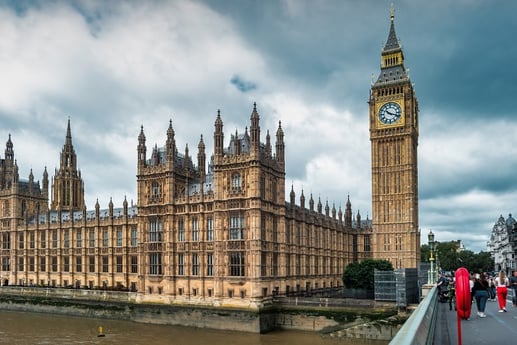Chancellor accentuates the positive at austerity Spring Statement

In Yesterday’s Spring Statement, the Chancellor Exchequer was able to put some positive spin on lower growth forecasts and the rollout of a series of austerity measures.
The key headlines were:
- The latest Office for Budget Responsibility (OBR) forecast for GDP growth in 2024 was halved to 1.0%, which looks optimistic compared to the Bank of England prediction of 0.7% but is lower than the OECD at 1.4%.
- GDP growth in every subsequent year of the forecast has been increased. So, the OBR is calling better times further down the line.
- Recent reforms to welfare spending and plans to cut department budgets mean the Chancellor’s £9.9 billion of fiscal headroom has been rebuilt and a trajectory towards meeting the budget rules has been re-established.
- Defence spending will increase by £2.2 billion per annum (and mostly be counted as capital investment) via raiding the overseas development budget, where it previously was day-to-day spending. This is an example of the government meeting its rules by reallocating spending to where it will count as investment.
- £2 billion a year of additional capital investment was announced, as well as £2 billion for affordable homes.
The audience the Treasury was targeting for this statement was the financial markets, eager to avoid a re-run of the 2022 ‘mini-budget’ debacle. Downing Street appears to be relying on the size of the government’s Parliamentary majority to counterbalance potential disquiet from its backbenches on the scale of the welfare cuts.
We suspect the financial markets will be temporarily reassured, but there is awareness that the government’s books are finely balanced, and any further deterioration for public finances will probably require tax rises in the autumn budget. Earlier this week, better than expected PMI data from UK companies was released, which followed the announcement of a small improvement in consumer confidence last week. The government now needs these tiny ‘green shoots’ for the economy to flourish over the spring and summer, or another difficult fiscal statement lies ahead.
Critically, the idea there might be some strengthening of the economy in the coming months, even if it is tentative, is a credible scenario. Next month sees the increase for the national minimum wage, which should improve consumer spending. Yesterday’s greater-than-expected fall in inflation reminds us that further cuts for the Base Rate are forecast.
From a property market perspective, much will depend upon the reaction of the financial markets, and whether the Chancellor’s statement will calm some of the volatility that has buffeted gilt yields in the last six months. Stability for gilts could improve debt availability for real estate and concentrate investors’ minds on the relatively attractive pricing of property yields today.
The latest MSCI UK Monthly index showed that all-property capital values grew for a seventh consecutive month in February on a month-on-month comparison. The sub-index for industrial capital values has now risen for eleven months in a row, and we no longer view this sector as being in a downturn. The MSCI figures still point to declining values for offices, although anecdotally we have noticed a more upbeat attitude towards the sector among investors lately, with interest growing in re-entering the stronger parts of the market, like major city centres.
Our view is the recovery for property is likely to be gradual, not a rebound, but values have held up well through the volatility for gilts and the economic slowdown of the last six months. This suggests property owners are financially strong enough to wait out the recent volatility, which has been prompted by external shocks and not by any underlying problems for UK property.
Time is now needed to fully assess the financial market reaction to the Chancellor’s statement. However, if the statement is welcomed by investors, we feel the government’s decision to put fiscal discipline first will add to the case for UK property this year. Therefore, we believe the property market is at the turning point in the cycle, with investment volumes set to begin increasing as buyers re-enter the market to take advantage of the low point for pricing.
James Roberts
+44 (0)20 7911 2580
